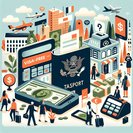
China and South Korea have spent much of 2025 rolling out reciprocal short-stay visa-free schemes, and the first comprehensive data are now in. According to officials quoted by China Daily, Chinese group bookings to South Korea jumped more than 60 percent in October compared with September, while Korea’s Bank of Korea estimates that every additional million Chinese visitors can lift Korean GDP by 0.08 percentage points. On the Chinese side, Trip.com reports that South-Korean arrivals to Shanghai, Beijing and other mainland cities have more than doubled year-on-year since the mainland began granting 15-day visa-free entry to Korean passport holders in late 2024.
The rules are generous by regional standards. Korean tour groups of three or more may enter any Korean airport or seaport without a visa until 30 June 2026 for stays of up to 15 days; China’s waiver for Korean passport holders currently runs through 31 December 2025 on identical terms. Jeju Island’s long-standing individual waiver remains in place, giving independent travellers extra flexibility. Both governments stress that the schemes are temporary "pilot" measures but officials in Seoul and Beijing say privately that extensions are likely if visitor spending meets expectations.
Commercial impact is already visible. Lotte Duty Free reported a 45 percent year-on-year jump in October sales to Chinese nationals, and Chinese carrier Juneyao Airlines says its new Shanghai–Busan route is operating at 92 percent load factor. Korean cosmetics brands, meanwhile, are rushing to restock mainland flagship stores ahead of the November shopping season, betting on a rebound in in-person sales.
Corporate mobility managers should prepare for faster approval cycles: tour operators can now confirm group trips within 24 hours, and individual business travellers report that airlines are accepting visa-free arrangements at online check-in without additional document upload. Employers should, however, remind staff that work, study and journalism still require the appropriate visas.
Longer term, analysts say the programmes are a litmus test for wider North-East Asian mobility liberalisation. If the China–Korea experiment sustains political support, observers expect Japan and perhaps ASEAN partners to seek similar reciprocity with Beijing, potentially redrawing the region’s travel map by 2027.
The rules are generous by regional standards. Korean tour groups of three or more may enter any Korean airport or seaport without a visa until 30 June 2026 for stays of up to 15 days; China’s waiver for Korean passport holders currently runs through 31 December 2025 on identical terms. Jeju Island’s long-standing individual waiver remains in place, giving independent travellers extra flexibility. Both governments stress that the schemes are temporary "pilot" measures but officials in Seoul and Beijing say privately that extensions are likely if visitor spending meets expectations.
Commercial impact is already visible. Lotte Duty Free reported a 45 percent year-on-year jump in October sales to Chinese nationals, and Chinese carrier Juneyao Airlines says its new Shanghai–Busan route is operating at 92 percent load factor. Korean cosmetics brands, meanwhile, are rushing to restock mainland flagship stores ahead of the November shopping season, betting on a rebound in in-person sales.
Corporate mobility managers should prepare for faster approval cycles: tour operators can now confirm group trips within 24 hours, and individual business travellers report that airlines are accepting visa-free arrangements at online check-in without additional document upload. Employers should, however, remind staff that work, study and journalism still require the appropriate visas.
Longer term, analysts say the programmes are a litmus test for wider North-East Asian mobility liberalisation. If the China–Korea experiment sustains political support, observers expect Japan and perhaps ASEAN partners to seek similar reciprocity with Beijing, potentially redrawing the region’s travel map by 2027.









